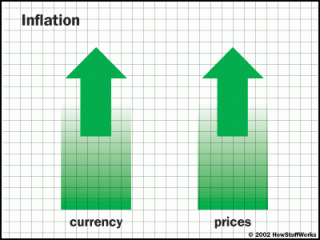
From Naked Capitalism:
An article by Edward Harrison originally posted at Credit Writedowns.
I am 100% sure that the U.S. will go into hyperinflation. Not tomorrow, but the problem with the government debt growing so much is that when the time will come and the Fed should increase interest rates, they’ll be very reluctant to do so and so inflation will start to accelerate.
–Marc Faber, Bloomberg, May 2009
During the world’s last inflationary period in the 1970s, the West witnessed social unrest of the most acute kind, bordering at times on anarchy. If stagflation can lead to anarchy, hyperinflation can lead to and has led to much worse. Hyperinflation is the economic apocalypse many doomsdayers pose as the logical end to the world’s experiment with fiat money.
In a letter to clients last June, Rob Parenteau of the Richebacher Letter wrote about Weimar, one of the worst episodes of hyperinflation:
“The Weimar Republic, born of a revolution in 1918, played host to a hyperinflationary breakdown of the German monetary system by 1923. Austria faced a similar episode of hyperinflation in 1921–2, and no doubt, the searing scars of these experiences deeply informed the thinking of Mises, Hayek, Haberler, Machlup and other leading contributors to the Austrian School in the 20th century.
“Hyperinflation episodes are characterized by rapidly accelerating inflation, a collapsing foreign exchange rate and, eventually, a widespread disorientation and disruption of productive activity. Keynes, writing in 1919, well before the terminal stages of the Weimar hyperinflation had been revealed, characterized the nature of the mayhem involved in such episodes as follows:
“As the inflation proceeds, and the real value of the currency fluctuates wildly from month to month, all permanent relations between debtors and creditors, which form the ultimate foundation of capitalism, become so utterly disordered as to be almost meaningless; and the process of wealth-getting degenerates into a gamble and a lottery.”
Is this what awaits the US or the UK? Marc Faber’s quote to open this post is symptomatic of the kind of rhetoric which says yes. I love Marc Faber. I consider his interviews first-class economic entertainment. You will continue to see him featured in my posts on a regular basis. And I certainly share some of his concerns about inflation, bailouts, moral hazard (and so forth and so on, as he would say).
But, is Marc Faber an ideologue pushing a rhetorical line of argument to the point of hyperbole or should we take his warnings very seriously?
Let’s attack this question using Zimbabwe and Weimar Germany as examples. These are the two most extreme cases of hyperinflation that economic historians have ever witnessed. They are instructive in regards to what causes hyperinflation and what does not.
ATTENTION READERS
We See The World From All Sides and Want YOU To Be Fully InformedIn fact, intentional disinformation is a disgraceful scourge in media today. So to assuage any possible errant incorrect information posted herein, we strongly encourage you to seek corroboration from other non-VT sources before forming an educated opinion.
About VT - Policies & Disclosures - Comment Policy



